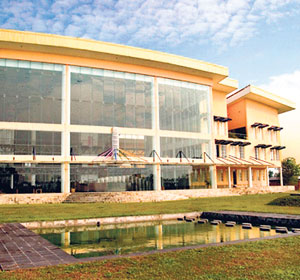Brand Sri Lanka's profile has seen a recent rise thanks to increasing foreign interest in local ventures, from positive sentiments by international investment guru Jim Rogers, followed by a personal visit by him to the island, to reports of a bidding war between UAE's Etisalat and others, yet to be confirmed, for local mobile provider Tigo (owned by Luxemburg-based Millicom).

Millenium IT college campus |
Now, a new and unexpected move by another global entity has again placed the spotlight on Sri Lanka with the September 16th announcement that the London Stock Exchange (LSE) has ‘agreed to acquire’ Sri Lankan-based Millennium Information Technologies (MillenniumIT) for US$ 30 million (UK£ 18 million).
It is reported that 73% of the deal is to be in cash along with an estimated 600,000 LSE shares; an amount much lower than initial speculation by UK's Financial Times and Telegraph newspapers which indicated the figure would be nearer to UK £50 million. It was also revealed that LSE had "already received irrevocable undertakings representing over 90 per cent of the shares" with the offer document since mailed to MillenniumIT shareholders and the deal expected to be finalized by October.
LSE indicates that this will result in an "estimated annual cost savings of at least £10 million from (2011-2012)". Also, with MillenniumIT currently servicing high-profile institutions such as UK's Intercapital PLC (ICAP), the London Metal Exchange and emerging stock exchanges in Lusaka, Dar-Es-Salaam and Botswana, as well as former assignments which included the American Stock Exchange, preliminary indications are that this transaction may prove to be beneficial to the future growth of MillenniumIT’s capital markets business. MillenniumIT's Chief Executive Officer, Tony Weerasinghe, is quoted in the LSE buyout announcement as saying: "(LSE's) backing gives us the resources to continue supporting our existing customers, expanding the company into other markets and investing for the future,” However, it is hard to predict what conflicts may arise between LSE and MillenniumIT clients in the future.
Meanwhile, in return, LSE is said to benefit from technology improvements which its current trading platform (TradElect) sorely lacks, including greater speed in receiving orders and increased scalability (capacity); a factor which has seen LSE lagging behind competitors such as Chi-X Europe in the past. There could also be additional benefits from having an 'in-house developed trading system'. LSE’s Chief Executive Officer, Xavier Rolet, is quoted in the announcement as saying: "MillenniumIT is a proven business, already serving multiple clients in multiple geographies, including some of the best known in their fields. The potential from this transaction is considerable for both parties."
Further, according to the announcement, MillenniumIT will be LSE's "in-house software development team, gradually replacing our current suppliers and bringing intellectual property and know-how fully within the company.
We look forward to introducing their proven trading platform before the end of 2010, which will provide our clients with sub-millisecond trading latencies and give the [LSE] a very fast, multi-product, cost-efficient, scalable trading platform. The transition will be carefully managed, with further enhancements to TradElect planned in the interim.”
When contacted by the Sunday Times FT, a spokesperson from MillenniumIT’s local campus at Malabe declined to comment on the specifics of the LSE transaction.
However, the company's Chief Operations Officer, Anush Amarasinghe, did state: "This proves that Sri Lanka is ready once again for investment from prestigious overseas organisations following the end of the internal war." |

